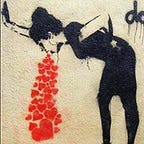Saving Anna Karenina
Part 13
Start with Part 1, and read a short synopsis of the the original book.
SERYOZHA WAS IN THE KITCHEN setting out plates of food. He held up the bags of sauce from the Senegalese restaurant with a gleeful smile and greeted her in English.
“Good evening, moms.”
He always forgot vegetables, Anna noticed. It was always the same potatoes, rice, bread, fowl, and soup. She went over and kissed him on the forehead, took off the blue cap he had taken to wearing, and tousled his now short, Americanized hair. He leaned in and hugged her.
“Is that an Orthodox symbol on your hat?” she asked in Russian.
“No, it’s a baseball team.”
“Is that what those boys do on the street with the hoop?”
Seryozha explained about basketball, his new pride since he learned to play Horse with his classmates. They were mostly bullies and made fun of the Russian words he used, saying he sounded like a grandfather. But as he improved in shooting baskets they were milder.
He hated the uniform he had to wear to school, and as soon as the bell rang at the end of the day he went in the bathroom and changed into his jeans so that he didn’t look like an outcast on the subway back home. When his foot crossed over the line of the school property onto the street, he flipped on his Yankees hat.
Mama let him stay on the street in the afternoon playing; he thought this was because it was exactly the opposite of what Papa would have done — Papa wanted him the read the Bible and study even after his tutors had left. Papa would have forbidden him to play with the boys on the street, who were brown and black and foreign and not the children of Papa’s friends. Although Papa didn’t have any real friends.
The landlady was yelling at her husband in the next room. Seryozha played with the baby, who was fussing from the yelling. Anna felt drained. She wanted to go to sleep for many days. The meeting was overwhelming, but good for her to participate in a social forum, even if it was for commoners. Dmitry would approve of her magnanimity.
“Elena?” she said.
“Yessss?” She sounded harassed as usual, wrestling with a basket of soiled clothing.
“What is a rock star?”
“OH ANNA,” said Margaret the next day, breathing a small laugh into the phone. “She’s gay, and she wants to go out with you.”
“What do you mean, dear?” she said.
“Dmitry, your friend in Petersburg, he’s homosexual. Right?” said Margaret.
“Oh, Dmitry, yes of course.”
“Well, have you ever met a woman who’s homosexual?” said Margaret.
“A woman?”
Margaret chuckled. “Oh, yes. As a matter of fact, Jean and I, we’re gay. Did you not know that?”
Anna had detected something unusual in their companionship. But in Russia, spinsters often banded together in the same fashion.
“But tell me, what does that mean exactly?” she asked.
“It means we’re companions, the way you and Count Vronsky were companions.”
“You’re lovers?” said Anna.
“Yes, and life partners,” said Margaret.
Anna imagined the chaste sexual relations that must go on between Margaret and Jean; caressing, kissing…hardly different than the relations between schoolgirls.
“And that woman,” continued Margaret. “Sheila Rivera, she was asking you to go on a date — to court, as you would say,” Margaret continued.
“She wants to be my lover?”
“Well, I don’t know about all that, but she wants to see you in…a romantic way.”
Anna let out a low laugh that reverberated across the telephone line.
“How do you feel about that?” said Margaret after a moment of pause.
“I feel — well, I don’t want it, dear Margaret. I hope you understand.”
“Of course I understand. We don’t expect everyone to be like us!” Margaret laughed. “Then you can just throw away Sheila Rivera’s phone number. It is quite funny that your first advance from a woman came from a famous rock star.”
“She seemed to believe that by courting her, I could regain what I’ve lost,” said Anna.
“Well, that’s just manipulative. I’m sorry, but she’s setting a bad example. Those meetings are supposed to be about treating an illness, not taking advantage of people’s weaknesses for personal gain, or sex.”
“And several other women told me I was codependent.”
“Well, I don’t know exactly what that means, but dear, let’s face it, you don’t need Vronsky to be fulfilled. You know we’ve discussed this before.”
“Well, shall I go to this other meeting which Allison proposed to me?”
“Allison would know better. I’ve never been part of a 12-step program, so I don’t know which is best for you, or if it’s for you. But I do think you would benefit from a support group.”
“Support for what?” said Anna.
“Well, the kind of support I’m giving you. There are people who are much better at this than I am.”
“I can’t believe that, Margaret. You’re a superb confidante. I love you.”
“I love you too, Anna.”
Margaret encouraged Anna to do all sorts of things — stroll in the park, shop for food and cook, visit museums and galleries, go to “the movies.” She didn’t like to go out alone because everyone looked at her, and she knew it was because she was alone. She was so ashamed to be alone, at her age. Anna was thirty-two, and she wanted to shout at the strangers that she had a lover, that he was in Russia.
